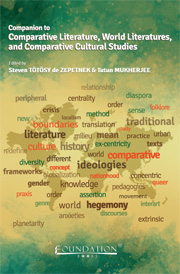Book contents
- Frontmatter
- Contents
- Introduction to the Companion to Comparative Literature, World Literatures, and Comparative Cultural Studies
- PART 1 Theories of Comparative Literature, World Literatures, and Comparative Cultural Studies
- PART 2 Comparative Literature in World Languages
- African Literatures as World Literatures
- Comparative Literature in Arabic
- Comparative Poetics in Chinese
- Comparative Literature in French
- Comparative Literature in German
- Comparative Literature in Iberian Spanish and Portuguese
- Comparative Literature in Indian Languages
- Comparative Literature in Italian
- Comparative Literature in Latin American Studies
- Comparative Literature in Russian and in Central and East Europe
- Comparative Literature in the United States
- PART 3 Examples of New Work in Comparative Literature, World Literatures, and Comparative Cultural Studies
- PART 4 Multilingual Bibliography of Books in Comparative Literature, World Literatures, and Comparative Cultural Studies
- Index
Comparative Literature in Arabic
from PART 2 - Comparative Literature in World Languages
Published online by Cambridge University Press: 05 April 2014
- Frontmatter
- Contents
- Introduction to the Companion to Comparative Literature, World Literatures, and Comparative Cultural Studies
- PART 1 Theories of Comparative Literature, World Literatures, and Comparative Cultural Studies
- PART 2 Comparative Literature in World Languages
- African Literatures as World Literatures
- Comparative Literature in Arabic
- Comparative Poetics in Chinese
- Comparative Literature in French
- Comparative Literature in German
- Comparative Literature in Iberian Spanish and Portuguese
- Comparative Literature in Indian Languages
- Comparative Literature in Italian
- Comparative Literature in Latin American Studies
- Comparative Literature in Russian and in Central and East Europe
- Comparative Literature in the United States
- PART 3 Examples of New Work in Comparative Literature, World Literatures, and Comparative Cultural Studies
- PART 4 Multilingual Bibliography of Books in Comparative Literature, World Literatures, and Comparative Cultural Studies
- Index
Summary
Abstract: In her article “Comparative Literature in Arabic” Marie-Thérèse Abdel-Messih presents a brief history of the discipline's development in its intellectual and institutional provenance. Abdel-Messih's approach to the history of comparative literature in Arabic is with focus on translation understood as a “planetary movement.” Of note is that the discipline was taken up and propagated by literary journals prior to the establishement of comparative literature in the academe. Owing to the colonial histories of the region, Francophone scholarship remains as a driving force although U.S.-American comparative literature is gaining in interest.
Historical CONTEXT
Locating geographies and dating beginnings of comparative scholarship in Arabic would ignore its multiple histories and distinct practices. Instead, I describe comparative literary scholarship in Arabic as part of a planetary movement that came in response to historical events which required mutual translation (see, e.g., Allush; Gould). Relevant is that this counters exclusionary approaches based on competitive scenarios of priority and origins; besides, Arab cultural processes cannot be studied as self-enclosed systems divided from world systems. Scholars of Arabic—regardless of origins or geographical locations—ought to be looked at as actors and creators of discourse in comparative scholarship. Among Western scholars, Rebecca Gould acknowledges that comparative scholarship in Arabic may be considered as part of a planetary movement when Arab-European contacts along history would be taken into account (169). In the Western Middle Ages, Arabic translations from Latin texts abounded.
- Type
- Chapter
- Information
- Companion to Comparative Literature, World Literatures, and Comparative Cultural Studies , pp. 231 - 238Publisher: Foundation BooksPrint publication year: 2014

